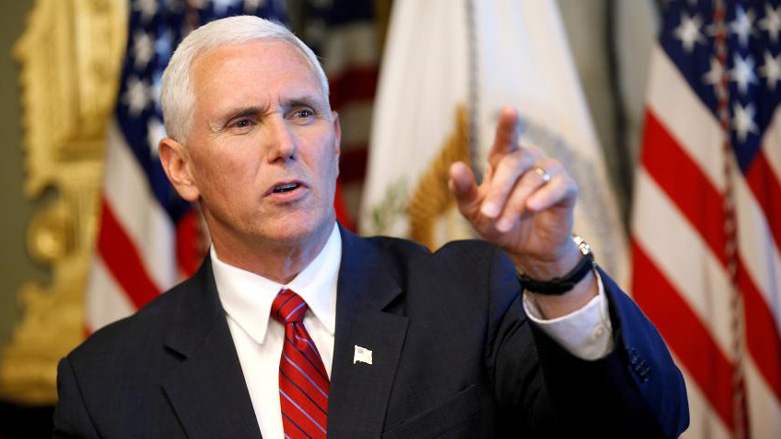VP Pence explains US concerns, including on Kurds, to Iraqi PM

WASHINGTON DC, United States (Kurdistan 24) – US Vice-President Mike Pence on Thursday spoke with Iraqi Prime Minister Haider al-Abadi by telephone.
The conversation marked the first such official communication between the two leaders and seemed to represent a US decision to include a more senior, political level in the implementation of US policy toward Iraq.
It also, reportedly, marks something of a shift in US policy, driven by a growing concern about Iranian influence in Iraq, an informed Washington source told Kurdistan 24.
The Trump administration’s policy, as formulated in its first year, was premised on the notion that Abadi was a reliable partner who would contain Iran. But according to Entifadh Qanbar, an Iraqi-American and President of the Future Foundation in Washington, that is no longer the case.
A series of issues—including Iraq’s declared intent to purchase the Russian S-400 air defense system, as well as Abadi’s recent decision to recognize Iranian-backed militias, known as the Popular Mobilization Forces (PMF), and accord them the privileges and salaries of the Iraqi Army—seem to have prompted something of a change in Washington.
Abadi had promised US officials that he would disband the PMF, Qanbar explained. Instead, he has done the opposite.
The US account of the Pence-Abadi exchange noted they had discussed the upcoming Iraqi elections and “reports of Iran attempting to meddle” in them and in forming the next government.
Pence stressed the need “to ensure free and fair elections” and include Iraqis “displaced by the fight” against the Islamic State—who are overwhelmingly Sunni. Excluding them would benefit Tehran.
For the US to become more actively involved in countering Iran, and not simply rely on Abadi to do so, would redound to the advantage of the Kurdistan Region, Paul Davis, a former Pentagon analyst of Kurdish affairs, told Kurdistan 24.
The Kurds are the strongest, most coherent element capable of resisting Iranian influence in Iraq, Davis noted.
Qanbar welcomed the apparent shift in the US position. The policy first adopted by the Trump administration has been a failure, and the Kurds paid dearly when the US turned a blind eye to the Iranian-orchestrated attack on Kirkuk, Qanbar said.
Pence’s discussion with Abadi also included an affirmation of the Trump administration’s “deep commitment to protect persecuted Christians and other religious minorities in Iraq.”
The Vice-President has been deeply involved in this issue. Last October, he addressed the annual conference of “In Defense of Christians,” an organization dedicated to protecting Christians and other religious minorities in the Middle East.
In December, Pence met with the Chaldean Archbishop of Erbil, Bashar Warda, as the cleric visited Washington.
The more extreme Shia militias, now formally under Abadi’s command and on par with the Iraqi Army, have been conducting a deadly campaign against Christians in Baghdad. Just last week, a family was found murdered in their home in a predominantly Shia neighborhood of the Iraqi capital.
Pence also affirmed the US commitment to the Kurdistan Region. The Vice-President told Abadi that he “was pleased to hear more about re-opening of the Iraqi Kurdistan Region’s airports and the initial payment of some Kurdistan Regional Government salaries.”
However, despite Abadi’s declarations, basic problems remain in his handling of these matters. What visa system will apply once international flights resume?
Will Kurdish visa procedures remain as they were—i.e. US and EU passport holders will be able to enter the Kurdistan Region without visas? Or will they be subject to Baghdad’s regulations, which would require visas?
That is not yet resolved. If all visitors need Iraqi visas, that will give Tehran authority over who enters the Kurdistan Region, as Iraq’s Interior Ministry is effectively under Iranian control.
And while Abadi has announced that he has begun to pay the salaries of some employees of the Kurdistan Regional Government, the money remains in a branch of the Iraqi Central Bank in Erbil, not yet disbursed.
Qanbar read the US account of the Pence-Abadi exchange as a “warning” to the Iraqi Prime Minister—essentially a list of US complaints.
Supporting his view is the fact that the US posted its account of the discussion on an official website and Pence tweeted about it. By contrast, Abadi has said nothing so far.
Editing by Nadia Riva
